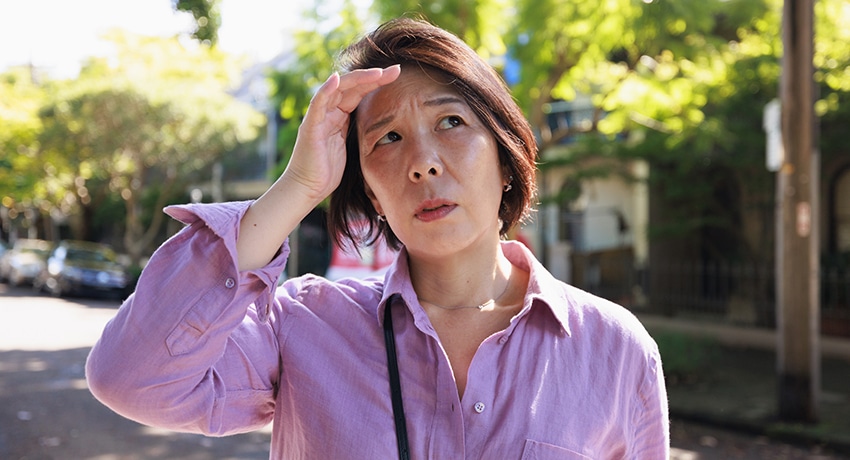Apparently, data can back up the term “hot and bothered.”
According to a recent psychiatric study published in the Journal of the American Medical Association, hotter days link to higher emergency department visits related to mental health. These cases included depression, suicide, aggression, alcohol or substance abuse, anxiety, and domestic violence.

Extreme heat can affect mental health, explained Bobby R. Nix, MD, psychiatrist with UT Physicians Psychiatry Outpatient Clinic and director of UT Physicians Behavioral Health Outpatient Services for McGovern Medical School at UTHealth Houston.
“The heat can trigger the release of stress hormones, and those stress hormones can increase anxiety and other issues associated with a mental condition,” Nix said.
Stress hormones are a solid medical reason for the correlation in the study, but sickness may be another reason.

“Being in intense heat can cause some mental health stressors, but it can also cause dehydration and heat stroke that can cause agitation or confusion, or mimic other symptoms of a mental health problem,” said Jennifer Noblet, LCSW-S, manager of behavioral health for Healthcare Transformation Initiatives with UT Physicians.
Mental disorders or illnesses, however, are not seasonal or weather-related conditions, as both professionals are quick to point out.
“A mental health disorder can occur any time of year. It’s not just due to weather conditions. Social or environmental events can trigger someone,” Noblet said. “Mental health care and wellness must be a year-round priority.”
“There’s a variety of reasons for these conditions, and we all need to keep track of our mental health and make it better,” Nix said. “Our mental health affects our whole health.”
As Houstonians step out into the “dog days of summer,” these experts share their advice to improve your mindset.
Stay hydrated
Drink plenty of water each day – and drink more in high temperatures.
“Too much heat exposure can cause headaches and make you physically and mentally sick,” Noblet said. “We should all drink several glasses of water daily, but you need more when you spend time outdoors in the heat. Our body produces sweat to cool us down in intense heat, but the loss of fluid affects our bodily functions.”
Other fluids can also help hydrate, but alcohol is not one of them.
“Alcohol dehydrates you. Plus, it affects your brain chemistry, which can make depression or anxiety worse,” Noblet said. “You’ll often find alcoholic beverages at barbecues and other gatherings, so be mindful of your intake, especially in hot weather.”
Sleep well
Maintain a sleep schedule that affords you eight hours of uninterrupted sleep each day.
“Sleep is always going to be a factor in mental health. Lack of sleep increases the chance of depression and anxiety. Sleep is important, both for your physical and mental health,” Nix said.
Also, avoid staying up too late in the summer months.
“Because the sun is out longer, we tend to stay up later. This can rob you of your restorative sleep, which can affect your mood,” Nix said. “Try to keep a regular bed and wake up time to get adequate sleep.”
Eat right
Maintain a balanced diet, and try not to overdo the saturated fats and refined sugars.
“At get-togethers, we tend to eat foods high in saturated fat, like hot dogs and chips, and sugar, like sodas and sweets. They make you feel tired and sluggish afterwards,” Nix said. “Be conscious of what you eat because your diet affects your blood sugar, which affects your energy and mood.”
Opt for low-fat proteins and fibrous vegetables instead of processed or fried foods, fresh fruit instead of baked sweets or candy, and water instead of sugary drinks.
“The foods that are better for our bodies are better for our minds,” he said.
Keep fit
Stay physically active, and exercise at least a few times a week.
“Physical activity strengthens our heart and bones, and it makes you feel happier. When we exercise, your body releases chemicals that lower stress, anxiety, and depression. It improves our mental health,” Nix said.
For outside exercisers, always carry a bottle of water, and modify your schedule or location.
“In hot months, work out earlier or later in the day – or just go inside to a gym. Working out in extreme heat is not safe,” Nix said.
Keep kids occupied
When children are on school break, limit their gaming, television, and smartphone time.
“Too much screen time has a negative effect on a kid’s mental health. It can reduce their sleep, affect their mood, and increase their stress and anxiety levels. Limit the electronics,” Nix said.
To keep children from getting too bored or isolated during their “off” months, add physical and educational activities to their day.
“Activities don’t have to be expensive. The Houston Public Library, for instance, offers learning camps and reading programs that are free,” he said. “It also helps to give kids chores. Kids, like adults, need to have some purpose to their day.”
Get help
When your feelings or behaviors start to become concerning, go see a doctor.
“According to the National Alliance on Mental Illness, 1 in 5 adults in the U.S. experienced a mental illness in 2020. It’s not specific to any gender, race, socioeconomic class, or profession,” Noblet said. “When symptoms of a mental illness become too frequent, start with your primary care provider.”
The doctor can prescribe medication and/or refer you to a behavioral health therapist within UT Physicians, Noblet elaborated. Patients can then receive therapy at any of the six community-based clinics or Texas Medical Center.
“People from certain racial and ethnic backgrounds are less likely to receive the mental health treatment they need. This is due to many factors, such as systematic barriers accessing care, socioeconomic disparities, cultural beliefs, or stigma. However, do not let that stop you from seeking help,” Noblet said.
“The culture of mental health has changed,” Nix said. “Depression, addiction, and other mental health problems don’t need to be hidden. These medical conditions can be treated to live a healthier, happier life.”



